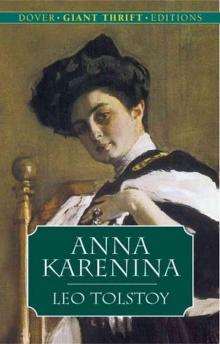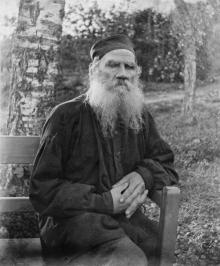- Home
- graf Leo Tolstoy
Anna Karenina Page 3
Anna Karenina Read online
Page 3
Chapter 3
When he was dressed, Stepan Arkadyevitch sprinkled some scent onhimself, pulled down his shirt-cuffs, distributed into his pockets hiscigarettes, pocketbook, matches, and watch with its double chain andseals, and shaking out his handkerchief, feeling himself clean,fragrant, healthy, and physically at ease, in spite of his unhappiness,he walked with a slight swing on each leg into the dining-room, wherecoffee was already waiting for him, and beside the coffee, letters andpapers from the office.
He read the letters. One was very unpleasant, from a merchant who wasbuying a forest on his wife's property. To sell this forest wasabsolutely essential; but at present, until he was reconciled with hiswife, the subject could not be discussed. The most unpleasant thing ofall was that his pecuniary interests should in this way enter into thequestion of his reconciliation with his wife. And the idea that he mightbe led on by his interests, that he might seek a reconciliation with hiswife on account of the sale of the forest--that idea hurt him.
When he had finished his letters, Stepan Arkadyevitch moved theoffice-papers close to him, rapidly looked through two pieces ofbusiness, made a few notes with a big pencil, and pushing away thepapers, turned to his coffee. As he sipped his coffee, he opened a stilldamp morning paper, and began reading it.
Stepan Arkadyevitch took in and read a liberal paper, not an extremeone, but one advocating the views held by the majority. And in spite ofthe fact that science, art, and politics had no special interest forhim, he firmly held those views on all these subjects which were held bythe majority and by his paper, and he only changed them when themajority changed them--or, more strictly speaking, he did not changethem, but they imperceptibly changed of themselves within him.
Stepan Arkadyevitch had not chosen his political opinions or his views;these political opinions and views had come to him of themselves, justas he did not choose the shapes of his hat and coat, but simply tookthose that were being worn. And for him, living in a certainsociety--owing to the need, ordinarily developed at years of discretion,for some degree of mental activity--to have views was just asindispensable as to have a hat. If there was a reason for his preferringliberal to conservative views, which were held also by many of hiscircle, it arose not from his considering liberalism more rational, butfrom its being in closer accordance with his manner of life. The liberalparty said that in Russia everything is wrong, and certainly StepanArkadyevitch had many debts and was decidedly short of money. Theliberal party said that marriage is an institution quite out of date,and that it needs reconstruction; and family life certainly affordedStepan Arkadyevitch little gratification, and forced him into lying andhypocrisy, which was so repulsive to his nature. The liberal party said,or rather allowed it to be understood, that religion is only a curb tokeep in check the barbarous classes of the people; and StepanArkadyevitch could not get through even a short service without his legsaching from standing up, and could never make out what was the object ofall the terrible and high-flown language about another world when lifemight be so very amusing in this world. And with all this, StepanArkadyevitch, who liked a joke, was fond of puzzling a plain man bysaying that if he prided himself on his origin, he ought not to stop atRurik and disown the first founder of his family--the monkey. And soLiberalism had become a habit of Stepan Arkadyevitch's, and he liked hisnewspaper, as he did his cigar after dinner, for the slight fog itdiffused in his brain. He read the leading article, in which it wasmaintained that it was quite senseless in our day to raise an outcrythat radicalism was threatening to swallow up all conservative elements,and that the government ought to take measures to crush therevolutionary hydra; that, on the contrary, "in our opinion the dangerlies not in that fantastic revolutionary hydra, but in the obstinacy oftraditionalism clogging progress," etc., etc. He read another article,too, a financial one, which alluded to Bentham and Mill, and droppedsome innuendoes reflecting on the ministry. With his characteristicquickwittedness he caught the drift of each innuendo, divined whence itcame, at whom and on what ground it was aimed, and that afforded him, asit always did, a certain satisfaction. But today that satisfaction wasembittered by Matrona Philimonovna's advice and the unsatisfactory stateof the household. He read, too, that Count Beist was rumored to haveleft for Wiesbaden, and that one need have no more gray hair, and of thesale of a light carriage, and of a young person seeking a situation; butthese items of information did not give him, as usual, a quiet, ironicalgratification. Having finished the paper, a second cup of coffee and aroll and butter, he got up, shaking the crumbs of the roll off hiswaistcoat; and, squaring his broad chest, he smiled joyously: notbecause there was anything particularly agreeable in his mind--thejoyous smile was evoked by a good digestion.
But this joyous smile at once recalled everything to him, and he grewthoughtful.
Two childish voices (Stepan Arkadyevitch recognized the voices ofGrisha, his youngest boy, and Tanya, his eldest girl) were heard outsidethe door. They were carrying something, and dropped it.
"I told you not to sit passengers on the roof," said the little girl inEnglish; "there, pick them up!"
"Everything's in confusion," thought Stepan Arkadyevitch; "there are thechildren running about by themselves." And going to the door, he calledthem. They threw down the box, that represented a train, and came in totheir father.
The little girl, her father's favorite, ran up boldly, embraced him, andhung laughingly on his neck, enjoying as she always did the smell ofscent that came from his whiskers. At last the little girl kissed hisface, which was flushed from his stooping posture and beaming withtenderness, loosed her hands, and was about to run away again; but herfather held her back.
"How is mamma?" he asked, passing his hand over his daughter's smooth,soft little neck. "Good morning," he said, smiling to the boy, who hadcome up to greet him. He was conscious that he loved the boy less, andalways tried to be fair; but the boy felt it, and did not respond with asmile to his father's chilly smile.
"Mamma? She is up," answered the girl.
Stepan Arkadyevitch sighed. "That means that she's not slept again allnight," he thought.
"Well, is she cheerful?"
The little girl knew that there was a quarrel between her father andmother, and that her mother could not be cheerful, and that her fathermust be aware of this, and that he was pretending when he asked about itso lightly. And she blushed for her father. He at once perceived it, andblushed too.
"I don't know," she said. "She did not say we must do our lessons, butshe said we were to go for a walk with Miss Hoole to grandmamma's."
"Well, go, Tanya, my darling. Oh, wait a minute, though," he said, stillholding her and stroking her soft little hand.
He took off the mantelpiece, where he had put it yesterday, a little boxof sweets, and gave her two, picking out her favorites, a chocolate anda fondant.
"For Grisha?" said the little girl, pointing to the chocolate.
"Yes, yes." And still stroking her little shoulder, he kissed her on theroots of her hair and neck, and let her go.
"The carriage is ready," said Matvey; "but there's some one to see youwith a petition."
"Been here long?" asked Stepan Arkadyevitch.
"Half an hour."
"How many times have I told you to tell me at once?"
"One must let you drink your coffee in peace, at least," said Matvey, inthe affectionately gruff tone with which it was impossible to be angry.
"Well, show the person up at once," said Oblonsky, frowning withvexation.
The petitioner, the widow of a staff captain Kalinin, came with arequest impossible and unreasonable; but Stepan Arkadyevitch, as hegenerally did, made her sit down, heard her to the end attentivelywithout interrupting her, and gave her detailed advice as to how and towhom to apply, and even wrote her, in his large, sprawling, good andlegible hand, a confident and fluent little note to a personage whomight be of use to her. Having got rid of the staff captain's widow,Stepan Arkadyevitch took his hat and stopped to recollect whether
he hadforgotten anything. It appeared that he had forgotten nothing exceptwhat he wanted to forget--his wife.
"Ah, yes!" He bowed his head, and his handsome face assumed a harassedexpression. "To go, or not to go!" he said to himself; and an innervoice told him he must not go, that nothing could come of it butfalsity; that to amend, to set right their relations was impossible,because it was impossible to make her attractive again and able toinspire love, or to make him an old man, not susceptible to love. Exceptdeceit and lying nothing could come of it now; and deceit and lying wereopposed to his nature.
"It must be some time, though: it can't go on like this," he said,trying to give himself courage. He squared his chest, took out acigarette, took two whiffs at it, flung it into a mother-of-pearlashtray, and with rapid steps walked through the drawing room, andopened the other door into his wife's bedroom.

 Anna Karenina
Anna Karenina Sevastopol
Sevastopol The Cossacks: A Tale of 1852
The Cossacks: A Tale of 1852 The Kingdom of God Is Within You
The Kingdom of God Is Within You